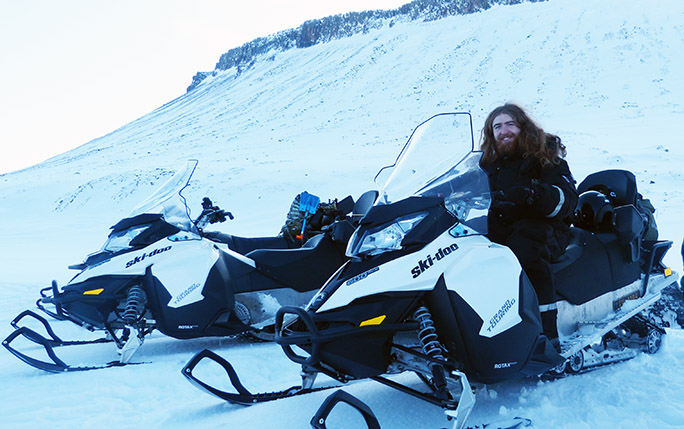CDT Student Interviews - Spotlight on Brandon Kelly

The new series of 'CDT Spotlight Interviews' gives you a personal insight into work, motivation and challenges of our students. For this interview we have spoken with Brandon Kelly who joined the CDT in 2017.
Why are you interested in Physics?
“I was first interested in space when I was about 4 and watched Toy Story which featured the intergalactic space ranger Buzz Lightyear. I spent the next decade or so going from wanting to be a space ranger to the slightly more realistic option (but admittedly not much more) of being an astronaut. It wasn’t until I was about 15 that I really linked this general interest in space to the physics which described it when I read Stephen Hawking’s “A Brief History of Time.”. That book sparked an interest which propelled me through A-level, undergrad, masters and into this PhD scheme. There is something inexorably compelling to me about understanding, at the most fundamental level, how the Universe around is structured and how it functions.”
How did you end up in Liverpool?
“I grew up here. I went away for University to a town on the coast of Wales called Aberystwyth, I then went further away during my final year for an exchange semester to UNIS in Longyearbyen, Svalbard. When it came to applying for PhDs my scope for applications was quite broad but I ended up back home.”
What were your biggest misconceptions about working as a researcher before starting your PhD?
“Before I started my PhD I wasn’t sure what to imagine. I did have an image in my head of a textbook scholarly figure surrounded by stacks of papers frowning thoughtfully at a series of mind-bending equations on a whiteboard. Broadly speaking, this was not the case. I think my two biggest misconceptions were timeframes and styles of working. During my degree I got into the, admittedly unhealthy, habit of staying up for days at a time working ceaselessly on any given assignment. This method of working implanted the idea that any given task is doable within a few days and will yield a satisfying result, since University assignments typically revolve around well established physics with a definitive answer. PhDs are not primarily assignment based. It is an ongoing project over multiple years. As such it is not practical to tackle a PhD using the same short term focus which may be applied during a degree.”
Which of your experiences or achievements would you use to recommend pursuing a PhD?
“How you recommend something heavily depends on who you are recommending it to. If someone has been pursuing physics purely out of a love of the subject, then almost any experience will sell a PhD. The chance to obsessively pursue one incredibly specific facet of a subject you are passionate about is a wonderful thing, but beyond that the chance to meet so many other people in the same situation at international meetings and conferences devoted exclusively to the enthusiastic discussion of that subject seals a PhD as a perfect and unique opportunity, if the highlights of a PhD appeal to you and you can stick out the struggles. If someone is more on the fence then one aspect of a PhD which is undersold is the opportunity to travel. A standout experience for me was being in a small village in the north of Italy, high in the alps attending a conference tailored almost exactly to the topic of my project and being given the opportunity to present my research to a group of the leading experts in the field.”
Has your PhD experience so far convinced you to pursue an academic career or are you more interested in applying your skills in industry?
“A key feature of the CDT is the industry placement. As such, CDT students have the advantage of an educated comparison when answering this question. From my own experience on placement, industry is an excellent avenue of opportunities. There are many different sectors, a huge variety of opportunities and a wide range of potential outcomes which may well have immediate observable effects on the world, a luxury rarely shared by blue-sky research. Nevertheless, the appeal of academia maintains a greater hold on my interest. Science is an inherently collaborative community where the greatest achievement is simply to discover something interesting because you find it interesting. Having immersed myself so heavily in this ideology it is difficult to imagine working any other way.”
How has Covid-19 affected your research?
“The methodology behind science is now almost entirely computer based, as such moving to working from home was not entirely detrimental to continuing with work. The advent of video conferencing technology as well as cloud based computing and remote-access processing clusters meant that both supervisory contact and high-level computing were available from home. The major effects of Covid on my own work have been more personal. The issues with working from home are the many distractions of home life and one of the most vital and rewarding parts of working in science: the scientific community and the many opportunities for discussion which come with that. Overall, the situation is bearable but I look forward to a return to normalcy as soon as it is safe to do so.”
At this point in your PhD, what is the achievement you are most proud of?
“I am currently working on a piece of software called ICICLE (Iterative Computational Intra-Cluster Light Extraction). The aim of the software is to automate image processing and the extraction of intra-cluster light from galaxy clusters. Automation of the techniques involved in this process is non-trivial and presents many challenges however I am pleased to say that the software is now usable.”